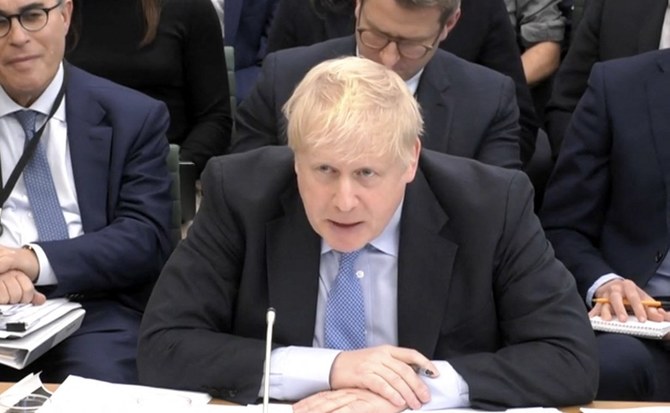
arrie Symonds has been through many of the standard tribulations of the first lady. Yes, she’s been accused of undue influence, but no more than Cherie Blair was, or Hillary Clinton, or indeed, anyone with the audacity to be female in such a very public way.
Yet this week’s storm – she is said to be in open combat with Dominic Cummings, the pair vying to see whose vision would prevail for the cabinet reshuffle – didn’t seem to belong to the modern era so much as the early modern. It was Cardinal Richelieu fighting Marie de’ Medici, Henrietta Maria beefing with just about everyone – storms remembered not for the personalities within them, but as indicators of dissatisfaction with the authority above them.
In the days of absolute monarchy, criticism would be heaped on the people around the king; poor decisions always blamed on the rung below, with indecisiveness explained by rifts in the inner circle rather than, say, the guy at the top being unable to make up his mind. Like algebra, this is stuff you learn without any expectation of using it in later life. It is monumentally strange and unsettling to look around at modern governments in the developed world and find their most obvious correlatives in the 17th century.
Advertisement
Five years ago, it would have been highly unusual to find a leader’s family involved in government. You wouldn’t have expected a prime minister’s dad, for instance, to be anywhere near the political arena; not because – having no fitness for such a role – he might say an uncomfortable thing (witness Stanley Johnson and his certainty that the British public would never be able to spell Pinocchio); nor because he might accidentally copy in the BBC as he acted as an unofficial diplomat to China (yuh huh, Stanley again).
But the dynastic model doesn’t really make sense without an underpinning theory of divine right: in an absolute monarchy, the ruler’s authority is in his blood, so what could possibly be more natural than his father sticking his oar in?
Get anywhere near democracy and all those innate features – blood, DNA – become not just deprioritised but antithetical to the concept of an election. How could anyone be born to rule when we, the people, have only just decided? This is what makes the sight of a younger Trump or an elder Johnson, or for that matter an unelected adviser, so unsettling on the world stage. Not because they are unqualified, or tactless: but because, in order to make sense of them at all, we have to recast our minds away from the state of citizenship, back towards the state of subjectship.
Nepotism and reliance on closed cliques of warring-volatile characters are within the legal scope of modern leaders
This brings with it a certain amount of cognitive dissonance; you may know you’re an American citizen, but your leader is behaving like a royal, with a dynasty and a court (when you look at his ever-replenishing pool of spokespeople, complete with a jester). You may think of yourself as a British subject only in relation to a benign and toothless queen (not literally! Heaven forbid that I would speculate on her majesty’s dentistry), but the prime minister has the trappings of a new kind of monarch. To overcome these extremely uncomfortable contradictions, we focus our scrutiny on these new entourages.
There is very often a sexist overtone – people question the intellect, for instance, of Ivanka Trump in exactly the same terms as they question the brainpower of young, attractive women everywhere. There can be a spiteful top note – when, at the G20 summit, Christine Lagarde appeared to scorn Ivanka (giving her a terrifyingly expressive look: “Why are you speaking? Why are you even here?”), I’m almost ashamed of how delighted I was that a grownup had arrived to put the upstart in her place.
Advertisement
Often, having ascended to such high influence by such unorthodox means, these figures lack even the knowledge and skills of the average intern. This leads them to say extremely stupid things with great confidence – Jared Kushner trying to bring about peace in the Middle East by stating, flat out, “don’t talk to me about history”, is merely the most recent example. And this is quite fun to watch, especially if you don’t have to live in any of the areas to which he intends to bring his arrogant and ahistorical balm.
Don Jr v Ivanka: is the battle to turn the Trump presidency into a dynasty heating up?
Arwa Mahdawi
Arwa Mahdawi
Read more
But it’s not really the point. Any of these family members could have governance skills up the wazoo. Stanley Johnson does, in fact, have considerable experience negotiating the environmental policies of the EU – though that’s become a vexed spot on his CV, since if he’d taken any of that seriously he would be unable to support his son in his endeavours. No qualification matters, since the deficit is institutional rather than personal: when the symbols of a government recall a time before democracy, it forces an acknowledgement of how much democratic accountability is, if not symbolic, at least informal.
There is no law against Boris Johnson sending one of his children on a peace mission, though of course he’d have to locate them first. There is only the mixed blessing of Trump’s great age that prevents him putting his mother in charge of defence. Nepotism and reliance on closed cliques of warring-volatile characters are within the legal scope of modern leaders. What has tended to prevent them has been a mixture of convention, precedent, honesty and honour – none of which are standing up especially well in a new world where breaking unspoken rules is proof of authenticity.
Paradoxically, the more I dwell on it, the less I have personally against the Stanleys, the Carries, the Dominics, even the Jareds; but the more fragile the system that they’ve made their playground looks.
• Zoe Williams is a Guardian columnist
As 2020 begins…
… we’re asking readers, like you, to make a new year contribution in support of the Guardian’s open, independent journalism. This has been a turbulent decade across the world – protest, populism, mass migration and the escalating climate crisis. The Guardian has been in every corner of the globe, reporting with tenacity, rigour and authority on the most critical events of our lifetimes. At a time when factual information is both scarcer and more essential than ever, we believe that each of us deserves access to accurate reporting with integrity at its heart.
You’ve read 11 articles in the last four months. More people than ever before are reading and supporting our journalism, in more than 180 countries around the world. And this is only possible because we made a different choice: to keep our reporting open for all, regardless of where they live or what they can afford to pay.
We have upheld our editorial independence in the face of the disintegration of traditional media – with social platforms giving rise to misinformation, the seemingly unstoppable rise of big tech and independent voices being squashed by commercial ownership. The Guardian’s independence means we can set our own agenda and voice our own opinions. Our journalism is free from commercial and political bias – never influenced by billionaire owners or shareholders. This makes us different. It means we can challenge the powerful without fear and give a voice to those less heard.
None of this would have been attainable without our readers’ generosity – your financial support has meant we can keep investigating, disentangling and interrogating. It has protected our independence, which has never been so critical. We are so grateful.
As we enter a new decade, we need your support so we can keep delivering quality journalism that’s open and independent. And that is here for the long term. Every reader contribution, however big or small, is so valuable. Support The Guardian from as little as $1 – and it only takes a minute. Thank you.












